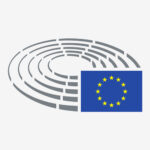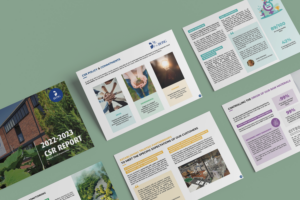
06 12 2024
Decoding the EU Deforestation Regulation (EUDR): 5 key measures for more responsible packaging
In response to climate change, massive deforestation, and their devastating effects on biodiversity, the European Union has adopted a new regulation to protect forests by combating deforestation. The European Deforestation Regulation (EUDR) came into force in June 2023 and was due to take effect on December,30 2024 (a postponement is in progress – check the EUDR timeline). The EUDR prohibits the import and placement on the European market of products derived from supply chains contributing to deforestation or the degradation of global forest ecosystems. Here, we decode this new regulation for you.
Table of contents
- The EUDR in response to the climate change and societal emergency
- The objectives of the European deforestation regulation (EUDR)
- Why and how does the EUDR impact packaging manufacturers?
- Top 5 key measures of the EUDR
- Measure #1: Mandatory adoption of a due diligence system
- Measure #2: Online due diligence statement
- Measure #3: Inspections and sanctions
- Measure #4: Country-based risk categorisation
- Measure #5: Creation of the European deforestation observatory
- EUDR timeline
- Further reading
- Glossary
The EUDR in response to the climate change and societal emergency
Deforestation is advancing at an alarming rate, leading to the loss of 420 million hectares of forests between 1990 and 2020. This phenomenon is responsible for 11% of global greenhouse gas (GHG) emissions, exacerbating climate change. By destroying these vital carbon sinks, deforestation increases GHG emissions while depleting biodiversity. Beyond being an ecological issue, the destruction of forests also impacts local populations, particularly Indigenous peoples, who rely on forest resources for their survival.
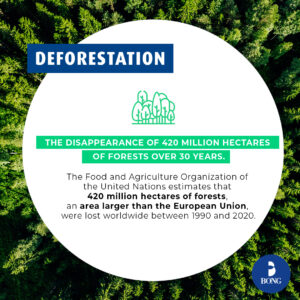
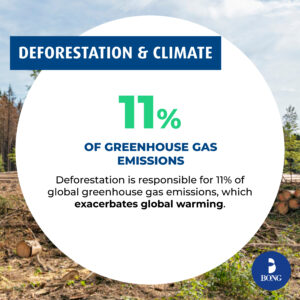
The objectives of the European deforestation regulation (EUDR)
The EUDR aims to achieve three main objectives to combat deforestation and the degradation of forest ecosystems:

Eliminate deforestation associated with imported products
Commodities such as soy, cocoa, coffee, wood, rubber, palm oil, and livestock can no longer be sold in the European Union after December, 30 2025 if they have contributed to deforestation.
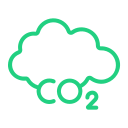
Reduce greenhouse gas emissions
By addressing deforestation, the EUDR helps preserve forests that capture carbon (carbon sinks) and contributes to combating climate change.

Protect biodiversity and local communities
By protecting forests, the EUDR aims to preserve the natural habitats of many animal species and safeguard the livelihoods of Indigenous populations.
Member States have repeatedly expressed their concern about persistent deforestation and forest degradation. They have emphasised that since current policies and action at global level on conservation, restoration and sustainable management of forests do not suffice to halt deforestation, forest degradation and biodiversity loss, enhanced Union action is needed in order to contribute more effectively to the achievement of the Sustainable Development Goals (SDGs) under the 2030 Agenda for Sustainable Development.
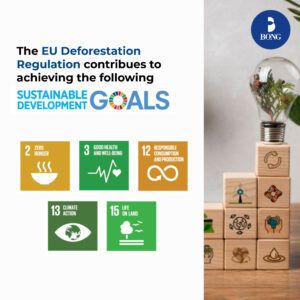
Why and how does the EUDR impact packaging manufacturers?
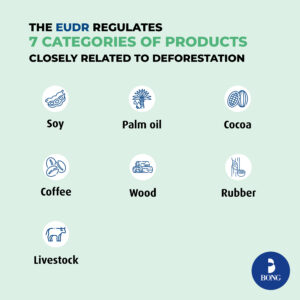
The European Deforestation Regulation applies to seven categories of products identified as the most destructive to forests: soy, palm oil, cocoa, coffee, wood, rubber, and livestock.
For the packaging industry, including companies like Bong, this regulation introduces new standards for traceability of raw materials and transparency in the supply chain. With the help of suppliers in the paper industry, packaging manufacturers must trace the origin of paper and cardboard (derived from wood) to ensure that deforestation is not part of their supply chain and meet the strict documentation requirements imposed by the European Deforestation Regulation (EUDR).
For packaging industry stakeholders, this means increased efforts to:
- On one hand: better control the origin of their raw materials and ensure that their suppliers’ activities do not contribute to deforestation;
- On the other hand: provide their customers, packaging buyers, with all the necessary information to prove that the wood sources used in packaging production meet the sustainability criteria set by the EUDR.
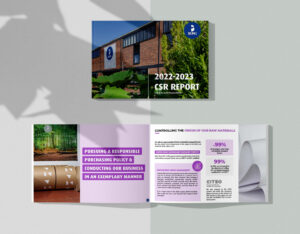
Bong has been pursuing an ambitious CSR policy for several years, with one of its main focuses being the implementation of a responsible purchasing policy. The paper used in the manufacture of our solutions (paper bags, gift bags, e-commerce bags, and envelopes) is over 99% sourced from sustainably managed forests and is PEFCTM or FSC® certified. The EUDR aligns perfectly with this focus, strengthening Bong’s commitment to sustainable practices and a transparent supply chain.
Top 5 key measures of the EUDR
The EU Deforestation Regulation (EUDR) introduces several concrete measures to ensure and prevent the import and placement on the European market of products that have contributed to deforestation.
Article 3 - Relevant commodities and relevant products shall not be placed or made available on the market or exported unless all the following conditions are fulfilled : a) they are deforestation-free; b) they have been produced in accordance with the relevant legislation of the country of production; and c) they are covered by a due diligence statement.
Measure #1: Mandatory adoption of a due diligence system
Article 8 of the EUDR stipulates that operators must implement a due diligence system aimed at minimising the risks of deforestation linked to their products.
This due diligence declaration includes:
- The collection of information, data, and documents
- Risk assessment measures
- Risk mitigation measures
Record keeping
Operators must review their due diligence system at least once a year. They are required to retain all documents related to due diligence, such as records, measures, and procedures, for a minimum of five years. These documents must be made available to the competent authorities upon request.
1. The collection of information, data, and documents (mandatory)
According to Article 9 of the EUDR, operators are required to collect and communicate the following information:
- A description of the product: including the type of product, its commercial name, and the common and scientific names of the tree species used to manufacture the product
- The quantity of the product placed on the market
- The country and/or production areas
- The geolocalisation (GPS coordinates) of all production plots, along with the production period
- The name, postal address, and email of suppliers involved in the production of the product, as well as the companies to whom the product was supplied
- All information proving that the product placed on the market is “deforestation-free” and complies with the laws of the country of production
The European Commission plans to create a database that assesses countries based on the likelihood that they contribute to deforestation during the production of goods. If the product placed on the market originates from a country classified as low-risk by the European Commission (see Measure #4), the operator may opt for a simplified due diligence process. This simplified system only requires the collection of the information mentioned above. Otherwise, the operator will also need to conduct a risk assessment and mitigation, as described below.
2. Risk assessment (only for products not originating from low-risk countries)
Article 10 specifies that, if the product does not originate from a country considered low-risk by the European Commission, companies must assess the risk that their products are linked to deforestation. This assessment is based on several criteria:
- The level of risk associated with the country of origin
- The presence of forests and Indigenous populations in the production country
- Consultations with local communities
- The level of deforestation or forest degradation
- The reliability of the information used
- The transparency and track record of the operators
- The complexity of the supply chains
- The risk of products being mixed with others from deforested areas.
3. Risk mitigation (only if a risk remains after the risk assessment step)
If the risk assessment concludes that there is no risk, no further action is required. Conversely, if risks are identified, companies must implement measures to mitigate these risks.
Article 11 requires companies to take measures to reduce the risk that their products are linked to deforestation, unless this risk is already deemed null or negligible. If a risk is identified, companies must take actions to mitigate it before selling or exporting their products.
These actions may, for example, include:
- Collecting additional information,
- Conducting independent audits,
- Providing training and support to help their suppliers comply with the rules.
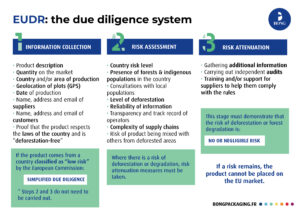
Measure #2: The online due diligence declaration
Before placing products on the EU market and following the information collection steps, operators and traders will be required to submit a due diligence declaration via an online information system managed by the European Commission, which will centralise all declarations.
This system will allow:
- Competent authorities, as well as the general public (after anonymisation), to easily access traceability information;
- Due diligence data to be transmitted to customs authorities to facilitate controls and the enforcement of sanctions.
By 30 December 2024, the Commission shall establish and subsequently shall maintain an information system which shall contain the due diligence statements made available.
Measure #3: Inspections and sanctions
The regulation also provides for a system of enhanced inspections to verify the compliance of products entering the European market, as outlined in Article 16 of the EUDR. The competent authorities in each Member State will be responsible for inspections and the enforcement of the regulation. In the event of non-compliance, strict sanctions may be imposed on businesses.
Article 24 specifies that sanctions must be effective, proportionate, and dissuasive to ensure operators comply with due diligence obligations. In the absence of corrective measures, operators in breach are subject to:
- Fines
- Confiscation of products or profits
- Or even a temporary market ban.
Measure #4: Country-based risk categorisation
Article 29 of the EUDR introduces a system for classifying countries by risk levels (low, standard, or high), established by the European Commission based on the likelihood of deforestation associated with the products they export to the EU. This classification is primarily based on the country’s deforestation and forest degradation rates, as well as the rate of agricultural land expansion for the seven categories of products responsible for deforestation (soy, palm oil, cocoa, coffee, wood, rubber, and livestock).
This categorisation affects the due diligence requirements. For products originating from low-risk countries, businesses benefit from simplified due diligence, consisting in the collection of information.
Measure #5: Creation of the European Deforestation Observatory
The EUDR (or EUDR) provides for the establishment of the EU Observatory on deforestation, forest degradation, changes in the world’s forest cover and associated drivers. This entity will be responsible for monitoring and analysing global deforestation trends. The Observatory, supported by remote sensing tools such as those from the Copernicus program, will centralise data on deforestation and make it accessible to authorities, businesses, and European consumers.
Timeline of the European Deforestation and Forest Degradation Regulation (EUDR)
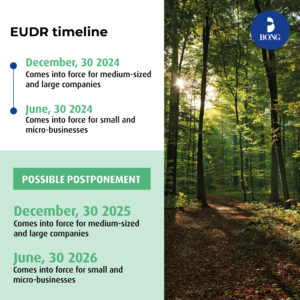
Initially, the regulation was set to come into effect on December, 30 2024. However, small and micro-enterprises are granted an additional 6 months and will need to comply by June 2025.
In October, following concerns raised by Member States and operators, the European Council voted to delay the adoption of the regulation by one year. In November, the European Parliament agreed to postpone the application of the EUDR to:
- December, 30 2025 for medium and large companies;
- June, 30 2026 for micro and small enterprises.
However, negotiations are still ongoing as of the writing of this article. The Parliament has decided to refer the matter back to the committee for interinstitutional negotiations. For these changes to come into effect, the agreed text must be approved by the Council and Parliament and published in the EU Official Journal.
For further reading
With the European Deforestation and Forest Degradation Regulation (EUDR), the European Union is taking a decisive step in contributing to the protection of global forests. In line with its commitment to a more responsible purchasing policy, as outlined in its CSR report, Bong sees the EUDR as an opportunity to integrate stricter environmental standards into its supply chains. This approach, focused on the traceability of our raw materials, not only strengthens the credibility of our CSR commitments but also meets the growing expectations of customers in terms of sustainability and transparency. Following the implementation of the PPWR regulation, which we explore in this article, the EUDR once again demonstrates the European Union’s determination to act in order to limit the environmental impact of its Member States.
Glossary
- Deforestation: The conversion of natural forests into land for non-forestry purposes, particularly for agriculture.
- Commodities concerned: Products identified by the EUDR as responsible for global deforestation, including soy, palm oil, livestock, wood, cocoa, and rubber.
- Carbon sinks: A natural or artificial element that absorbs and stores carbon dioxide (CO₂) from the atmosphere, thereby helping to reduce the amount of greenhouse gases (GHGs). The main natural carbon sinks are forests, oceans, and soils, which capture CO₂ through processes like photosynthesis or other biological processes.
- SDGs (Sustainable Development Goals): 17 interconnected global goals aiming to end poverty, protect the planet, and ensure prosperity for all by 2030. These goals cover a broad range of social, economic, and environmental issues.

